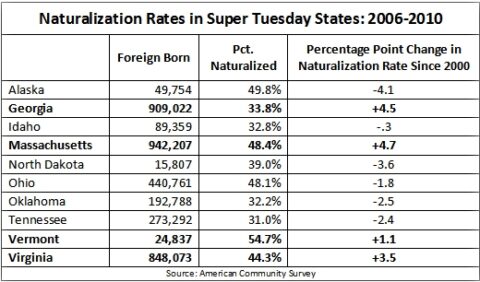South Carolina, District 7

Mother Jones Exposes Inner Workings of the Self-Deportation Movement
In its March/April issue, Mother Jones Magazine goes “inside the self-deportation movement,” exploring “164 state anti-immigration bills and the forces behind them.” The concept of “self deportation,” popularized by GOP presidential contender Mitt Romney, is central to the philosophy of “attrition through enforcement.” The basic idea is that, if you make life hard enough for unauthorized immigrants, they will pick up and leave of their own accord, which means the state will not have to hunt them down, detain them, and deport them. Read More

Mother Jones Exposes Inner Workings of the Self-Deportation Movement
In its March/April issue, Mother Jones Magazine goes “inside the self-deportation movement,” exploring “164 state anti-immigration bills and the forces behind them.” The concept of “self deportation,” popularized by GOP presidential contender Mitt Romney, is central to the philosophy of “attrition through enforcement.” The basic idea is that, if you make life hard enough for unauthorized immigrants, they will pick up and leave of their own accord, which means the state will not have to hunt them down, detain them, and deport them. Read More

Despite Alabama’s Cautionary Tale, Mississippi Moves Forward with Extreme “Papers, Please” Immigration Legislation
So much for Southern hospitality. Despite damning reports, bad press and mea culpas from politicians out of Alabama following passage of their extreme immigration law, HB 56, Mississippi lawmakers continued down the same destructive path this week. Mississippi’s “papers please” immigration bill, HB 488—which contains nearly all the same provisions as Alabama’s extreme immigration law, including those previously blocked by a Federal Appeals Court—passed out of two committees this week. In addition to the “papers, please” provision, Mississippi’s law also requires every public school to determine the immigration status of every enrolling student. The law also makes it illegal for any state or local governmental entity to engage in any “business transaction” with an undocumented immigrant—potentially denying basic medical care and access to utilities to families and children. The bill now goes back to the Mississippi House for debate. Read More

ICE Distorts Facts in Debate over Immigration Detainers
February was an important month in the debate over immigration “detainers,” the controversial tool used to strong-arm local jails into holding immigrants on the federal government’s behalf. In Connecticut, a class-action lawsuit was filed attacking detainers’ many legal vulnerabilities, and the Governor announced that state jails will not honor them in all cases. In Illinois, Cook County received another pointed letter from Immigration and Customs Enforcement (ICE) Director John Morton over a local ordinance enacted last year. While immigration detainers are a subject of legitimate public debate, the controversies demonstrate how ICE has resorted to making disingenuous legal claims in apparent hopes spreading the mistaken belief that immigration detainers must be honored. Read More

New Report Debunks Myth of Self-Deportation
Faced with harsh anti-immigrant laws passed by state or local governments, most unauthorized immigrants do not return to their home countries. That is the inescapable conclusion of a new report from the Center for American Progress (CAP), entitled Staying Put but Still in the Shadows, by Leah Muse-Orlinoff. The report finds that unauthorized immigrants react to anti-immigrant laws by moving to a different county or state, or by staying right where they are and isolating themselves even further from the larger society. In other words, GOP presidential contender Mitt Romney was wrong when he argued that a “self deportation” solution to the problem of unauthorized immigration might actually work. Read More

USCIS Convenes Summit to Consider Streamlined Path for Immigrant Entrepreneurs
By KIRSTEN SCHLENGER, MANAGING PARTNER AT WEAVER SCHLENGER MAZEL LLP. The business community has long heralded the vital role immigrant-owned startups play in creating American jobs. This month, it seems like someone at U.S. Citizenship and Immigration Services (USCIS) was listening. USCIS recently hosted its first in a series of summits dedicated to gathering expertise on how U.S. immigration law can enable foreign innovators to come to or remain in the U.S. lawfully while they start and grow businesses that benefit the U.S. economy. The informational summits, part of USCIS’s new Entrepreneurs in Residence (EIR) initiative, will result in the creation of a team of entrepreneurs and experts who are charged with designing and implementing USCIS policy that eases a path to the U.S. for talented immigrant entrepreneurs. Read More

Courts, State Legislators Pull Back on Restrictive Immigration Legislation
Although several states were eager to introduce their own restrictive immigration bills following Arizona and Alabama’s harsh laws, some legislators and federal judges are now pulling back on these costly bills. A federal judge in Utah this week refused to issue a ruling on the state’s immigration law in anticipation of a Supreme Court ruling on Arizona’s law while a federal judge in Nebraska struck down part of a restrictive city ordinance, finding a housing provision to be “discriminatory.” Meanwhile, legislators in Kansas and Virginia also failed to move forward on a series of restrictive immigration bills this week, due in part, as one article suggests, to the “political blowback to similar measures that have been enacted in states such as Arizona, Alabama and Georgia.” Read More

A New Way to Measure the Burgeoning Power of the Immigrant Vote
Voter registration is a key measure of immigrant integration. After all, what could be more American than casting your ballot on Election Day? When measuring immigrant voting patterns, voter registration is typically defined as the percent of naturalized immigrants (those who have become U.S. citizens) who are registered to vote. In other words, we only look at those currently eligible to vote because they have naturalized, instead of looking at the percentage of naturalized registered voters against all immigrants, documented or undocumented. The problem with that approach is we miss a big and important picture on the potential of the immigrant voting block—that many of those not eligible now, may well be eligible in the future. Read More

What the President’s 2013 Budget Means for the Administration’s Immigration Priorities
This month, President Obama released his FY2013 budget proposal, estimating $3.8 trillion in total spending in 2013. This budget proposal signals the beginning of the annual federal budget process. Congressional budget and appropriations committees will now spend months deliberating over the appropriations bills, which are unlikely to look anything like the president’s budget proposal. However, the president’s budget request does provide a window into the administration’s immigration priorities and plans. Read More
Make a contribution
Make a direct impact on the lives of immigrants.
